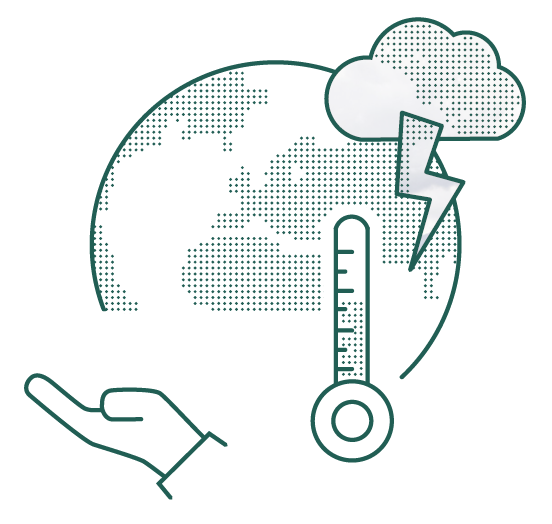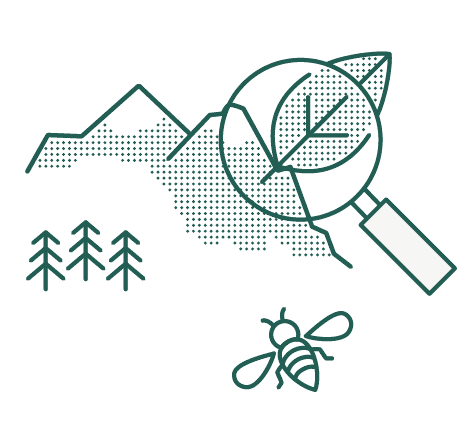Theory of Change
CIPRA’s Theory of Change was developed over 15 months from December 2021 to February 2023 through intense remote interactions and several in-person meetings. With the Theory of Change we walk towards our vision that life in the Alps will be sustainable and fulfilling. CIPRA’s Theory of Change evolves around three main themes – Nature, Climate and People – and three transversal themes – Communication, Knowledge & Skills, and Politics. All these themes are closely interconnected.
Long-term objectives were defined for each theme of our Theory of Change. CIPRA has a role in the achievement of these objectives, which are to be reached not by CIPRA alone but through the combined and transdisciplinary efforts of several parties – individuals, communities, civil society, authorities, the private sector, scientists, the media and others.
Climate: For the Alps to be climate-neutral by 2050

The climate crisis will not only result in rather more extreme weather events, such as droughts, floods, storms and avalanche winters in the Alpine region: there is also the threat of large-scale, fundamental climate changes that could drastically alter life in these regions with their different climates, or even jeopardise their survival. Achieving climate neutrality in the Alps is therefore the order of the day, one that must be pursued tenaciously and achieved at all costs. This requires political, economic, social and technological initiatives, which in turn mean gaining the support of the population. Effecting climate protection means using natural resources much more sparingly, producing fewer pollutants, focusing on energy efficiency and generating renewable energy in already built-up areas rather than in practically unspoilt landscapes. Technical efficiency and structural measures alone are not enough: lifestyles based upon sufficiency and production chains need to become the norm, in the sense of more resource-efficient, greatly decelerated working and leisure lives – even if this means changing many of our habits.
In order to drive this rethink forward, CIPRA is networking and raising awareness among politicians, administrators and businesses and, together with representatives of civil society, is designing pilot projects and concrete measures to make the Alps climate-neutral and climate-resilient by 2050 at the latest.
Nature: For biodiversity to thrive in the Alps

Rugged rock faces, flowering mountain meadows, buzzing insects: the Alpine landscape and its inhabitants are truly diverse. Around 30,000 animal and 13,000 plant species are native to the Alps: at the same time, humans are shaping and impacting nature as never before, through agriculture, tourism and buildings for settlements, infrastructure, and energy production. Growing or dying villages and expanding agglomerations, an increasingly dense network of roads, railway lines and tourist developments, intensive arable farming, livestock farming that is no longer suited to the location, and the dramatic progression of climate change are all threatening the richness of the species and landscapes of the Alps. The dominant influence of humans on nature is also associated with a great responsibility – the responsibility towards nature and towards future generations.
With its core theme of “Nature”, CIPRA is committed to a holistic understanding of humankind in the midst of nature. The unique biological diversity of the Alpine region can only be preserved in the long term if people prioritise natural cycles over their own immediate needs in their thoughts and actions. CIPRA brings together relevant stakeholders with projects and activities such as those aimed at strengthening natural diversity, managing watercourses or spatial planning. In this way, it helps to network ecosystems and stakeholders and anchor the vital preservation of biodiversity, both politically and in the field.
People: For people in the Alps to lead fulfilling lives and to treat their living environment with respect and care

Current challenges and threats in the Alps such as emigration, the climate crisis, heavy traffic flows and the destruction of resources cannot be solved by technological progress alone, but also require new behaviours and social changes. CIPRA addresses these challenges from the perspective of society and its potential. Personal initiatives, new collaborations and a rucksack full of skills and ideas are all needed to ensure that social, economic and political practices change quickly. The focus is on the need for a strong, cycle-oriented society that treats nature with respect and care and joins forces so as to realise all-round sustainable development in the Alps.
CIPRA aims to promote lifestyles and activities that support the survival of ecosystems in the Alps, are climate-friendly and socially just, and respect planetary as well as regional boundaries. We are convinced that more people of all generations need to become aware of their power to change, so that a frugal lifestyle is actually achieved and the common goods in the Alps are better protected.